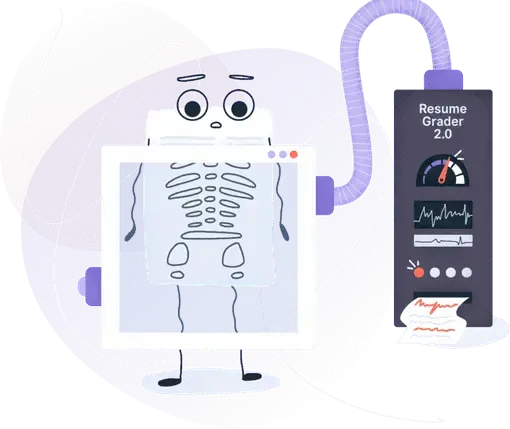How to Make Sure Your Crisis Management Skills Are Well-Described on Your Resume
Here are the top ways to show your crisis management skills on your resume. Find out relevant crisis management keywords and phrases and build your resume today.


Is your resume ATS-friendly?
Drop your resume here or upload a file to find out if the skills in your resume are readable by an ATS.
What is Crisis Management?"?
To define what crisis management is, we should first give a definition for a crisis. A wide range of situations can be defined as critical, but in most cases, we speak of a crisis when there is an extraordinary circumstance that needs to be handled.
Crisis is a time of intense disruption or sudden change, a time of great difficulty or a turning point. Usually in such cases, an important and impactful decision or series of decisions need to be made.
Crisis management then is the ability to steer this unusual disrupting event in a way towards stability, certainty, and positive change.
In terms of scale, there is a huge variation. You may think of a smaller crisis – such as the delivery of champagne bottles for the corporate event is scheduled to arrive 1 hour after the important announcement that is to be celebrated. Or you might have something bigger in mind – like the hostile acquisition of a small company with an uncertain outcome.
Why is Crisis Management Important on Your Resume?
Now you may think crisis management is not that important a skill if you’re not in a leadership or executive position – after all, in the operational field there are not that many huge strategic decisions to be made, jobs to be saved and money or important business relationships to be management. But let me offer a different point of view. Since we already mentioned that there are crises of varying scale, a small crisis could emerge in any person’s daily job.
Let’s take a look at a simple example. You’re a barista at an up-and-coming coffee shop and this is your first job. There is a huge queue for coffee drinks in the morning, but you notice that the coffee grinder has jammed, and your colleagues don’t have any ground coffee to prepare drinks with. Customers are getting impatient, insisting they be serviced, a few even walk out. Your supervisor is currently in a meeting with a vendor and cannot come to help and handle the mini crisis.
So, you take matters into your own hands, breathe slowly, and think of ways to come out of this situation. You suddenly remember there are a few packages of ground coffee under the bar waiting for a regular customer to come pick them up later. You offer to your fellow baristas to use it up while you all come up with a plan to fix the jammed coffee grinder. Day is saved!
Crisis management is not only about handling PR scandals and COVID-19 consequences. So, let’s talk about how you can showcase your own crisis management skills in the work experience you have so far.
What Activities and Accomplishments Help You Highlight Your Crisis Management Skills?
Whether you’ve handled huge or mini crises, it’s important to be able to describe that in your resume. This important and sought-after skill can be implied from mentioning some of the following qualities and activities:
Adaptability: in essence all crisis is a change of some sort, in most cases unexpected and negative. It takes flexibility and adaptability to see the good in the bad and adjust to the new situation.
Self-control and communication: when a crisis occurs, it rarely would be handled well by someone who is frantic or disorganized. Without good emotional self-regulation, it’s easy to fall prey to feeling doomed or panicky. Exhibiting self-control leads to calm and rational decision making, clear communication and effective problem-solving.
Creative problem-solving: thinking outside the box and coming up with solutions that haven’t been though of before is another A-skill needed for good crisis management. A creative thinker and problem solver would see the crisis as a challenge and embrace the chance to consider different perspectives and try out something new. After all, a lot of innovations are born out of necessity and critical moments.
"How to demonstrate crisis management on your resume":
- Think about critical moments in your career where you’ve been faced with adversity and had to act quickly
- Describe your creative outside-the-box approaches when problem solving
- Give examples of times when you were under a lot of pressure but handled it with grace
- Speak of your emotional intelligence and self-control and how they’ve come in handy when crisis stroked
- Share more about your adaptability and situations in which you had to adjust quickly
- Talk about your effective and clear communication skills and give examples to back it up (think about persuading, negotiation and calming down others)
Crises can emerge in many different forms and often without a warning sign. This is why describing your overall attitude towards unexpected change is important.
Saying your thinking is outside-the-box and you’re quick on your feet to act is not enough. In order to sound persuasive, you need to back this up with real life examples so try to be as specific as possible.
Try to answer the following questions when pondering how to express your crisis management skills:
- What is your approach when you have to quickly adapt to new circumstances?
- Do you see change as a challenge or as a problem?
- What examples of creative problem-solving can you think of?
- Did you go through any crisis or change management classes?
Below you can browse through other Enhancv users’ resumes and how they chose to show their crisis management skills. Do dig in!
Example 1: Demonstrate crisis management in the experience section
Job Situation: PR Specialist applying for a new role as a PR Manager
- •Built and maintained relationships with key consumer and trade media—both national and local
- •Successfully managed complex, fast-moving, and unexpected communications challenges with media and partners
- •Wrote PR, marketing and social media content (e.g., pitches, blogs, press releases, bylines) in a diplomatic and concise manner
From this description we gather that this PR specialist has experience in managing “unexpected communication challenges with media and partners” – although not explicitly said, this implies that they have handled some sort of PR crises.
One important skill in a PR professional’s toolbox is the ability to think and communicate clearly. The ability to formulate a clear point of view on complicated issues and create a concise and well-written narrative to express it is crucial in resolving delicate matters.
By sharing that they were able to build and maintain key relationships and also write media content in a diplomatic manner, they show trustworthiness and mediation skills.
Example 2: Demonstrate crisis management skills in the resume summary section
Job Situation: Tech co-founder preparing their resume for investment pitching
You don’t need to write “crisis management” in 5 different places on your resume to prove you have the skill.
In this summary the co-founder makes an outline of their most distinct qualities – inspiring, respectful, knowledgeable, strategist, focused on crisis aversion. It’s only mentioned casually but rounds up the whole picture perfectly.
It’s common for executives, business owners and startup founders to be faced with mini crises frequently, so it’s worth mentioning that on the resume.
Example 3: Show your crisis management skills in your achievements sections
Job Situation: Training Manager looking for a new position
From this achievements section we can see that this training manager is someone who can be relied on whenever change or crisis occurs.
In the first example, they served as the change agent using their power to handle the initial resistance towards change but also to stimulate and facilitate the change effort with the revamp of the training program. In the second example, we can see that they were brave and quick on their feet to move all operations online so that the business processes can go on fluently.
Example 4: Demonstrate the skill through other sections of your resume
Job Situation: Marketing & PR professional describes his coursework
Job Situation: Account Manager in an ad agency describes their strengths
If you find it hard to show off your crisis management skills through previous work experience, do not dismay!
An ideal way to show how well you can manage a crisis is through one of the additional sections - such as volunteering, extracurricular activities, courses or training you’ve undergone.
You may even outline your strengths to underline your best qualities. Check the example above – notice how this account manager gave specific examples to their strengths. Always be specific when you can – it gives substance to your words.
Crisis Management Skills: Key Takeaways for Your Resume
- Don’t make the whole resume all about your crisis management skills – see where it’s relevant to be mentioned.
- Avoid writing the same information twice – for example, if you’ve already mentioned that you’ve won an award for an achievement of yours in a specific job position from your previous experience, there is no need to refer to it again in section “Awards”.
- Mark important points throughout the resume – try to cross match them with key words from the job ad description. You’ll have more time to elaborate on them during the interview so make sure to prepare examples beforehand.
Make one that's truly you.




